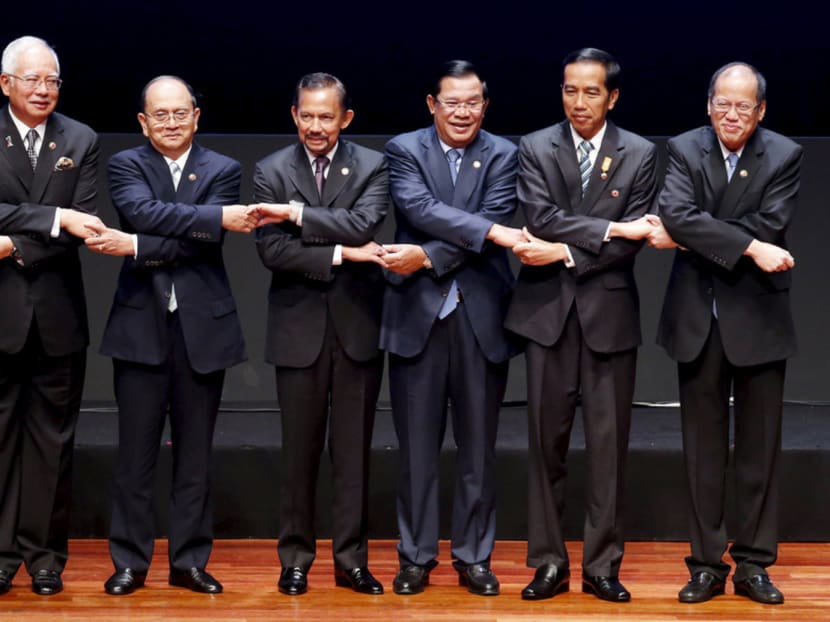Hun Sen urges ASEAN states to settle disputes directly with China
PHNOM PENH — Cambodian Prime Minister Hun Sen said the Association of Southeast Asian Nations (ASEAN) should opt for a new approach to help settle maritime disputes in the South China Sea, which involve four ASEAN member states and China.

(L-R) Malaysia's Prime Minister Najib Razak, Myanmar's President Thein Sein, Sultan of Brunei Hassanal Bolkiah, Cambodia's Prime Minister Hun Sen, Indonesia's President Joko Widodo and Philippines' President Benigno Aquino III, pose for a photo during the opening ceremony of the 26th ASEAN Summit in Kuala Lumpur, Malaysia, April 27, 2015. Malaysia is hosting the summit from April 26 to 27, 2015 in Kuala Lumpur and Langkawi. Photo: REUTERS
PHNOM PENH — Cambodian Prime Minister Hun Sen said the Association of Southeast Asian Nations (ASEAN) should opt for a new approach to help settle maritime disputes in the South China Sea, which involve four ASEAN member states and China.
In an exclusive interview with Kyodo News, Mr Hun Sen said the best scenario is to let the parties directly concerned in the conflicts — the Philippines, Vietnam, Malaysia and Brunei — settle their differences with China and leave the other states to “take a rest, observe and advise”. Otherwise, the 10-member group will not be able to resolve the issue.
Mr Hun Sen said on Tuesday that ASEAN is repeating Cambodia’s moves on the South China Sea issue, saying what was discussed in 2012 when Cambodia chaired the group and later in other member states up to this year remains unchanged.
“It is exactly equal when a comparison is made on the settlement of the South China Sea issue when the meeting was held in Phnom Penh and later in Brunei and now in Malaysia. It’s same same,” Mr Hun Sen said before flying back to Cambodia a day after the conclusion of the 26th ASEAN Summit in Malaysia.
However, a remarkable difference, he noted, was the pressure on and criticism levelled at Phnom Penh by some countries for failing to issue a joint communique in 2012 and this is “very unjust for Cambodia”.
Mr Hun Sen added that, over the past three years, he said little or remained silent about the maritime disputes, but had observed other member states sharing their views and found that they had spoken with the “same language”. The Cambodian leader said he had observed that the parties concerned, especially those who are involved in disputes with China, had been afraid to speak out whenever they were in front of Beijing.
When asked how he would respond to mass speculation that Cambodia is a proxy for China, the premier said there is no single country that does not have relations with Beijing, including those who have conflicts with it.
China and Vietnam are considered “tongue and tooth” and neither Hanoi nor Beijing can move away from each other while their constant relations cannot be ignored. Vietnam has more business dealings with China than it has with other ASEAN member states, he added.
Following the ASEAN summits last Sunday and Monday, host Malaysia issued a chairman’s statement saying that some ASEAN leaders share “serious concerns” about land reclamation undertaken in the South China Sea, which has eroded trust and confidence, and may undermine peace, security and stability in the region.
This drew a sharp response from Beijing, which stressed that all reclamation was legal and should not be questioned. KYODO NEWS






